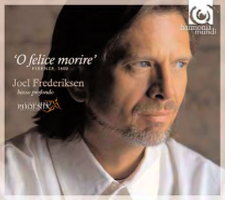
Stylistic Eloquence
Italian arias
and madrigals -
recommended by
MARIA NOCKIN'... performed with accuracy and grace.'
|

|
Joel Frederiksen is an American basso profundo with all the resonant low notes any opera lover could want. Although he has sung opera successfully, it does not allow him to use all his prodigious talents, so he has ranged somewhat farther afield. He is also an esteemed lutenist who has achieved world renown for his performances of early music. This type of music allows him to sing and play the lute with ensembles of like-minded musicians.
O Felice Morire ('O Happy Death'), his latest recording for harmonia mundi, features the members of Ensemble Phoenix: Joel Frederiksen, voice and archlute, Domen Marincic, alto and bass viol, Reinhild Waldek, triple harp, and Axel Wolf, guitar, chitarrone and tiorbino, performing in November 2007 at the Maltesestift St Jacob in Starnberg-Percha, Germany.
Listen -- Pietà di chi si more
(track 1, 2:36-3:29) © 2008 harmonia mundi
They open with the emotionally charged title piece, Pietà di chi si more, for which Giovanni Girolamo Kapsberger (c1520-1651) is thought to have written both the text and the music. It is found in his Libro secondo di aria passeggiate, which was published in Rome in 1623. The coloratura bass and his accompanists set the tone for the entire recording with their musically precise and vocally opulent rendition of this dramatic work. Much later on this disc, Mr Wolf plays the same composer's delightful Toccata V with great stylistic eloquence.
Tracks two through five, Armila ingrata and Filli Vezzoza by Andrea Falconiere (c1585-1656), Che farai Meliseo? by Sigismondo d'India (1582-1629) and Lo canterai d'amor, by Girolamo dalla Casa (c1543-1601) are lover's laments rendered with sensuous dusky sonorities by the singer and lutenist joined by one or more members of the ensemble.
The sixth selection, Superbi colli by Stefano Landi (1587-1639), which is played by the entire company, offers a slight change of pace in its sage comments concerning the war that the time wages against all human endeavour. Only at the very end does the singer mention that he needs time to heal his broken heart. The first light and happy melodic strains are heard at the beginning of song number seven, O vagha tortorella, which turns into a lament at its last line. Its music and possibly its verses were composed by Biagio Marini (1594-1663) who published it in Venice in 1635. Although this group tosses it off with seeming ease, in reality it is a showpiece for voice, archlute and guitar.
Listen -- O vagha Tortorella
(track 7, 0:07-0:35) © 2008 harmonia mundi
Stefano Landi's Se tu lasci perfida tuo danno, published in Venice in 1620, says that the singer no longer cares about his lost love. Frederiksen obviously cares a great deal about the quality of his performance, however. Every song is carefully interpreted with the utmost in stylistically correct virtuosity. Every ornament has a reason to be included and each is performed with accuracy and grace.
Listen -- Amor ch'attendi
(track 14, 0:00-0:45) © 2008 harmonia mundi
Tracks nine through fourteen contain works by turn-of-the-seventeenth century superstar, Giulio Caccini (1551-1618), from his publications entitled Le Nuove Musiche. One song, Io, che l'età solea viver nel fango, is particularly memorable because it is something we hear too frequently in real life: the excuses and protestations of a flagrant offender. Anyone who could sing them with as much feeling as Frederiksen does, however, would readily be forgiven.
That is followed by Giovanni Puliaschi's setting of a sonnet praising the works of the Creator by sixteenth century poet, Francesco Beccuti di Copperta. The finale is a suitably climactic work by a composer who was to influence vocal music for a long time to come, Claudio Monteverdi (1567-1643). Lo che nell'otio naqui e d'otio vissi, from Book 8 of his Madrigali guereri ed amorosi first seen in Venice in 1638, finishes this excellent disc with a dramatic recital of the deeds of a victorious king whom the singer is proud to follow.
Listen -- Io che nell'otio naqui e d'otio vissi
(track 17, 7:02-7:46) © 2008 harmonia mundi
This 74-minute disc gives us a fascinating insight into the music that was heard in seventeenth century Europe and perhaps even in what was then called New Spain. It transports us to a time of sailing ships, horse-drawn travel, candlelight and live acoustic music. If we abandon ourselves to an hour of uninterrupted listening, we can relieve some of our daily stress and allow the music to reveal some constant truths about the human condition. Luckily, in our time we can listen to the full measure of musical excellence on this well-recorded disc as often as we wish.
Copyright © 24 September 2008
Maria Nockin, Arizona USA

'O felice morire' (Firenze, 1600) - arias and madrigals by Caccini, Falconieri, D'India, Landi, Monteverdi, Dalla Casa, Marini and Puliaschi
HMC 901999 Stereo NEW RELEASE 74'03" 2008 harmonia mundi
Joel Frederiksen [j], coloratura basso profondo, archlute, direction
Ensemble Phoenix Munich:
Domen Marincic [d], viola da gamba
Reinhild Waldek [r], harp
Axel Wolf [a], theorbo, lute, tiorbino, guitar
Giovanni Girolamo Kapsberger (c1580-1651): Pietà di chi si more [all]
Andrea Falconieri (c1585-1656): Armilla ingrata [jar]
Falconieri: Filli vezzosa [all]
Sigismondo D'India (1582-1629): Che farai Meliseo? [j]
Girolamo dalla Casa (c1543-1601): Io canterei d'amor [dr]
Stefano Landi (1587-1639): Superbi colli [all]
Biagio Marini (1594-1663): O vagha Tortorella [ja]
Stefano Landi: Se tu mi lasci perfida tuo danno [jr]
Giulio Caccini (1551-1618): Dalla porta d'oriente [all]
Giulio Caccini: Muove si dolce [ja]
Giulio Caccini: Chi mi confort'ahimè [all]
Giulio Caccini: Io, che l'età solea viver nel fango [jar]
Giulio Caccini: Deh chi d'alloro [j]
Giulio Caccini: Amor ch'attendi [all]
Giovanni Girolamo Kapsberger: Toccata V [a]
Giovanni Puliaschi (died 1622): Locar sopra gl'abissi [jad]
Claudio Monteverdi (1567-1643): Io che nell'otio nacqui e d'otio vissi [all] |
BUY CLASSICAL CDS ONLINE
|

